Applications | Antibody/Protein Production
- Overview
- Suspension CHO Cells
- Suspension HEK-293 Cells
- Transfect Expi293F Cells
- Products
Biotherapeutic Protein Production in CHO and 293 Cells
- Achieve high yields of antibodies and other proteins in suspension CHO and 293 cells
- Compatible with multiple media formulations; achieve highest titers in CHO cells using CHOgro® Expression Medium
- Easy to use protocol
- Reproducible protein expression with minimal optimization
- Streamline your protein production by lowering labor and media costs
- No solubility and batch reproducibility issues like PEI
Working with suspension CHO cells?
NEW! TransIT-PRO® is now is a part of a complete high yield CHOgro® Expression System developed to achieve high yields in suspension CHO cells. Find out more >>
Reach critical stages faster
Decrease time to produce usable protein by maximizing target protein yields through transient transfection. The TransIT-PRO® Transfection Kit uses animal origin free components designed for high and reproducible nucleic acid delivery into suspension CHO and 293 derived cells. Since it is compatible with varied media formulations, the same media can be used for both transient and stable expression. The TransIT-PRO® outperforms linear PEI in protein yield, while providing a cost-effective alternative to FreeStyle™ MAX and 293fectin™ Transfection Reagents.
Poster: Maximizing Protein Expression in CHO Suspension Cells through Transient Transfection (PDF) (PDF)
Article: Maximize Protein Expression in CHO Suspension Cells (PDF), Juckem LK. Reprinted with permission from BioProcess International 8(7), July-August 2010; 122-123.
Estimated Cost Comparison Between Transfections using CHOgro® Expression System and 25 kDa Linear PEI*
* Hypothetical Scenario – If a researcher needed to produce 150 mg of a IgG protein (see comparison data in the table below), 4x more culture volume would be required if 25kDa linear PEI was used with the FreeStyle™ CHO Expression Medium compared to the CHOgro® Expression System. The cost comparison of 4x the materials and 1.5x the labor costs leads to a 40% reduction in costs if the CHOgro® Expression System is utilized. The PEI experiment would also take up more incubator space due to more flasks.
| Materials needed for 1 Liter Transfection | CHOgro® Expression System including TransIT-PRO® Transfection Reagent | 25 kDa Linear PEI (4X Materials, 1.5X Labor) | |
|---|---|---|---|
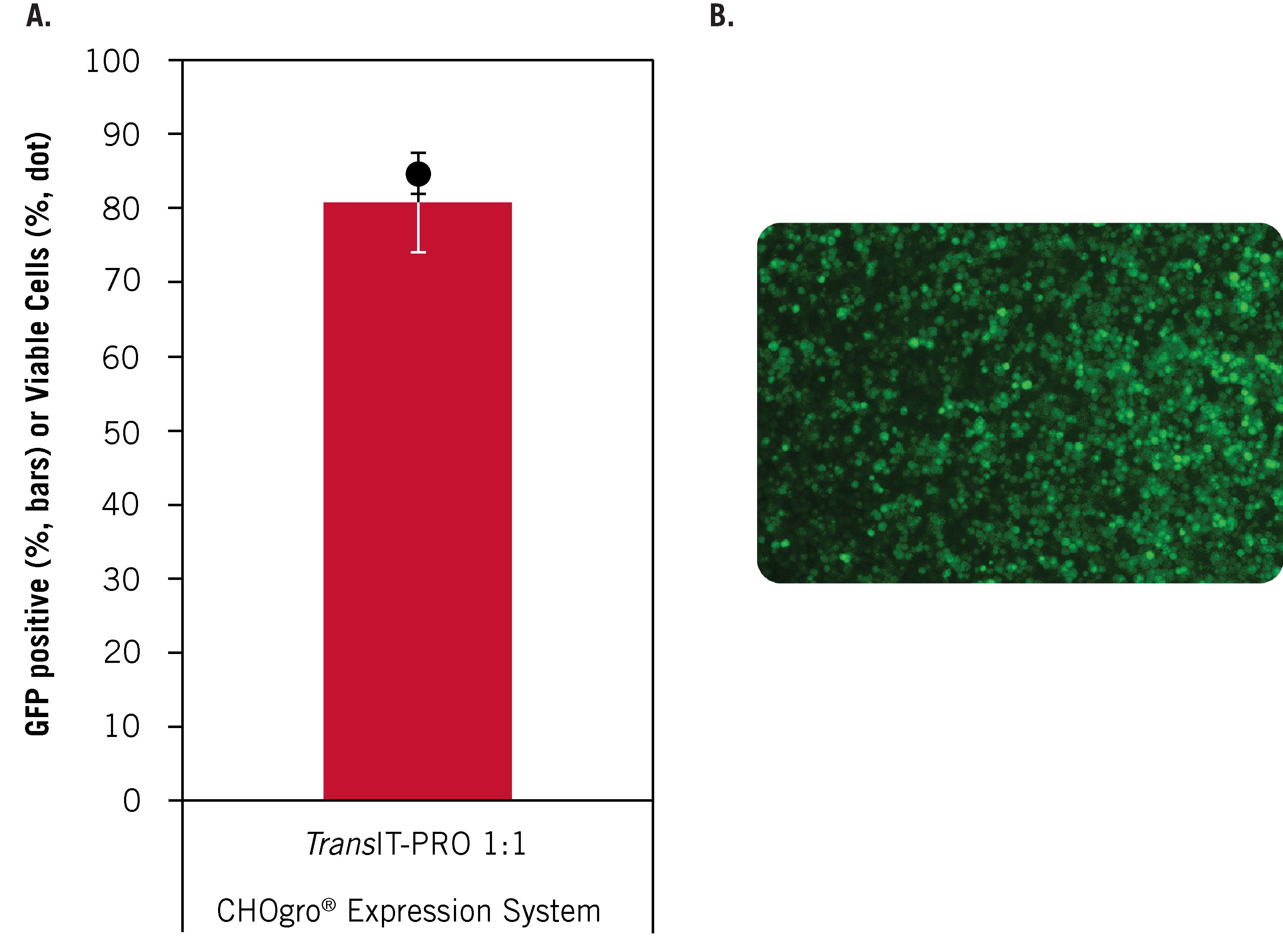 | 1L Media | $100.00 | $390.00 |
| 100 ml Complex Formation Media | $25.00 | $100.00 | |
| 1.0 mg DNA | $100.00 | $400.00 | |
| Transfection Reagent | $357.00 | $2.00 | |
| Disposable 1L Culture Flask | $102.00 | $408.00 | |
| Time in hours* $150.00 per hour | $750.00 | $1,125.00 | |
| TOTAL | $1,434.00 | $2,425.00 | |
| ~40% higher cost associated with PEI transfection reagent |
CHOgro® Expression System Outperforms Linear PEI. Human IgG was produced by transient transfection using TransIT-PRO® (1:1) or 25 kDa linear PEI (6:1) in either the CHOgro® or FreeStyle™ Expression System. CHO-S cells were grown in designated medium and split to 30ml per 125ml shake flask (Thomson). Clarified supernatants were analyzed using a human IgG ELISA (ZeptoMetrix). Error bars represent the standard error of the mean of triplicate technical replicates.
Achieve High Antibody Titers in Suspension CHO Cells
- High Protein Yield – Better yield than PEI or FreeStyle™ MAX Transfection Reagent
- Compatible with multiple CHO media formulations – Use with CHOgro® Expression Medium to Achieve Highest Yields
- Simple Workflow – Reproducible Protein Expression with Minimal Optimization
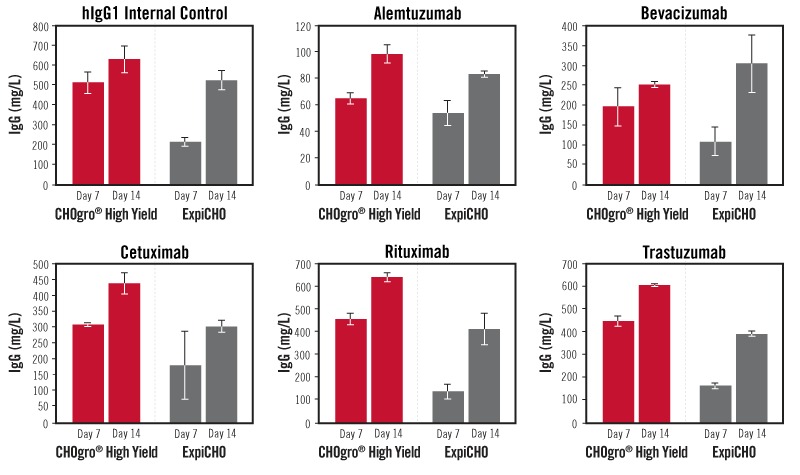
The CHOgro® High Yield Expression System Outperforms the ExpiCHO Expression System Using Multiple Antibody Constructs. Six different IgG1 antibody constructs, including five therapeutically relevant constructs synthesized in the same vector backbone were produced by transient transfection using either the TransIT-PRO® Transfection Reagent (Mirus Bio) at a 1:1 reagent-to-DNA ratio (vol:wt) and 1 µg plasmid DNA per milliliter of culture in FreeStyle™ CHO-S cells (ThermoFisher Scientific) cultured in CHOgro® Expression Medium (Mirus Bio) at a cell density of 4 x 106 cells/ml, or the Expifectamine CHO Transfection Kit (ThermoFisher Scientific) at a 3.2:1 reagent-to-DNA (vol:wt) and 1 µg plasmid DNA per milliliter of culture in ExpiCHO-S cells (ThermoFisher Scientific) cultured in ExpiCHO Expression Medium (ThermoFisher Scientific) at a cell density of 6 x 106 cells/ml. All cells were split into 125 ml Optimum Growth flask (25 ml/flask, Thomson Instrument Company) at the time of transfection. The CHOgro® Titer Enhancer was added immediately post-addition of transfection complexes and the culture was incubated at 32°C shaking until harvest for the CHOgro® High Yield Expression System. The Max titer protocol was followed for the ExpiCHO Expression System (ThermoFisher Scientific): Expifectamine CHO Enhancer and Feed (ThermoFisher Scientific) were added at 24 hours post-transfection and cultures were shifted to 32°C. At Day 5 a second volume of the ExpiCHO Feed (ThermoFisher Scientific) was added to the flask. Day 7 and 14 supernatants were analyzed using a standard sandwich human IgG ELISA. Error bars represent the standard deviation of triplicate technical replicates.
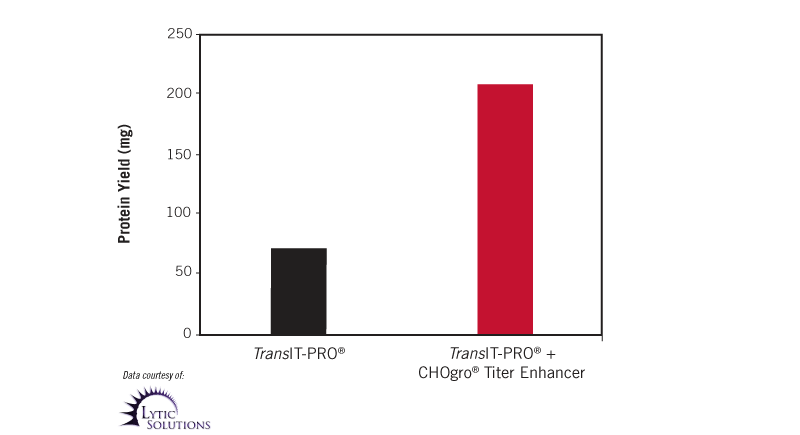
Validation of Increased Titers Obtained with CHOgro® Titer Enhancer. An Fc-fusion protein was produced by transient transfection of CHO-S cells in complete CHOgro® Medium (Mirus Bio) using TransIT-PRO® Transfection Reagent (Mirus Bio) at a 1:1 reagent-to-DNA ratio (vol:wt). As indicated, CHOgro® Titer Enhancer (Mirus Bio) was added and the culture was shifted to 32˚C following transfection. Yields represent final affinity-purified protein from 0.5 L culture, harvested at day 10 post-transfection. Data courtesy of Lytic Solutions, LLC.
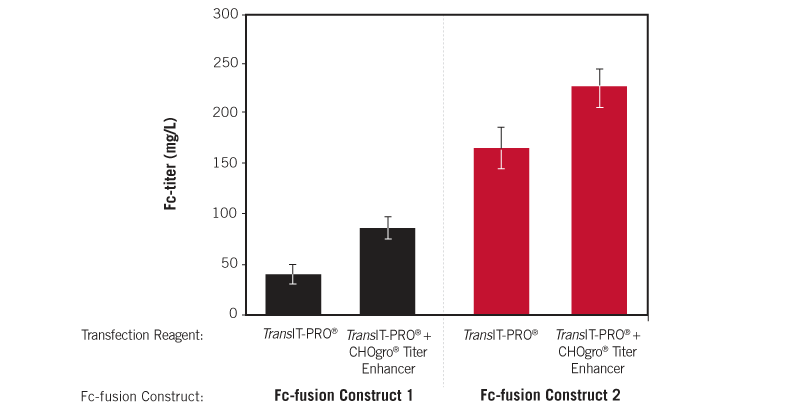
Titer Enhancement is Observed Using Multiple Fc-fusion Constructs. Two different Fc-fusion constructs were transiently transfected using the TransIT-PRO® Transfection Reagent (Mirus Bio) at a 1:1 reagent-to-DNA ratio (vol:wt) and 1 µg plasmid DNA per milliliter of culture. FreeStyle™ CHO-S (ThermoFisher Scientific) cells were cultured in CHOgro® Expression Medium (Mirus Bio) and plated at 4 x 106 cells/ml at the time of transfection in non-treated 6-well plates (2 ml/well). As indicated, CHOgro® Titer Enhancer was added and the culture was shifted to 32°C immediately post-addition of the transfection complexes to the culture. Day 10 supernatants were analyzed using a standard sandwich human IgG ELISA. Error bars represent the standard deviation of triplicate technical replicates.
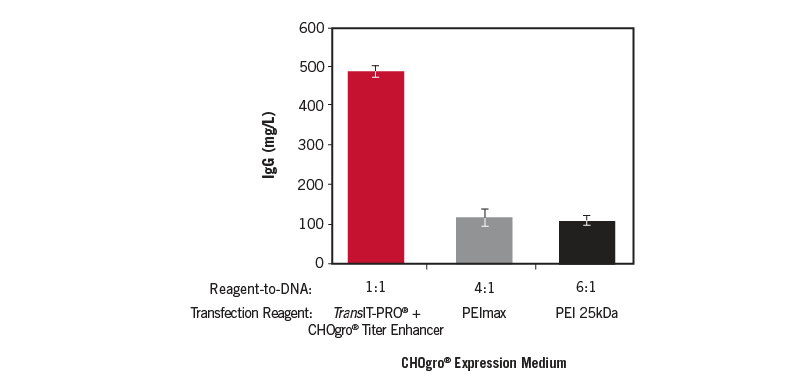
TransIT-PRO® + CHOgro® Titer Enhancer Outperforms PEImax and linear 25 kDa PEI Transfection Reagents. An IgG1 antibody construct was produced by transient transfection using either the TransIT-PRO® Transfection Reagent (Mirus Bio) at a 1:1 reagent-to-DNA ratio (vol:wt), PEImax (4:1, Polysciences), or linear 25 kDa PEI (6:1, Polysciences) and 1 µg plasmid DNA per milliliter of culture in FreeStyle™ CHO-S cells (ThermoFisher Scientific) cultured in CHOgro® Expression Medium (Mirus Bio) at a cell density of 4 x 106 cells/ml. CHOgro® Titer Enhancer (Mirus Bio) was added immediately post-addition of transfection complexes and cultures were incubated at 32°C with shaking until harvest for all reagents. Day 14 supernatants were analyzed using a standard sandwich human IgG ELISA. Error bars represent the standard deviation of triplicate technical replicates.
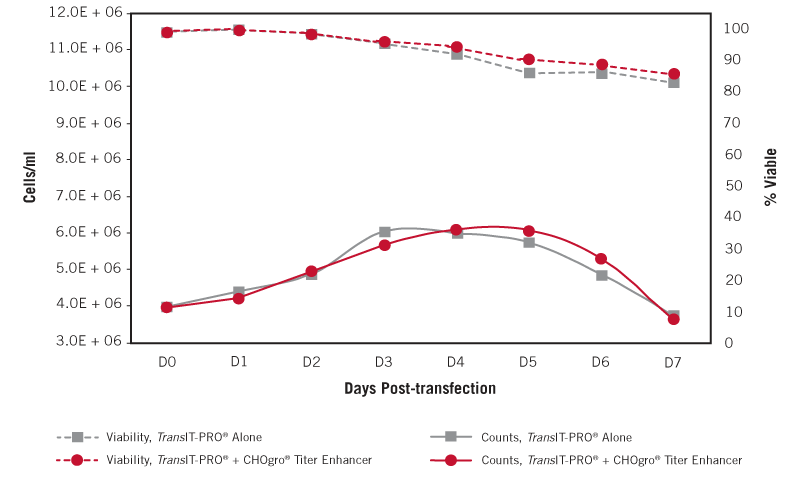
CHOgro® Titer Enhancer Does Not Adversely Affect Cell Growth and Viability Post-transfection. Triplicate flasks of FreeStyle™ CHO-S cells adapted to CHOgro® Expression Medium were transiently transfected with the TransIT-PRO® Transfection Reagent (Mirus Bio) at a 1:1 reagent-to-DNA ratio (vol:wt) and 1 µg plasmid DNA per milliliter of culture at 4 x 106 cells/ml in 125 ml Optimum Growth flasks (25 ml/flask, Thomson Instrument Company). As indicated, CHOgro® Titer Enhancer was added and all of the cultures were shifted to 32°C immediately post-addition of the transfection complexes to the culture. Cell counts (solid line) and viability (propidium iodide staining, dotted line) were measured daily post-transfection using a Guava® easyCyte™ 5HT flow cytometer (EMD Millipore).

High Efficiency Transfection of CHO-S Cells Using the TransIT-PRO® Transfection Reagent. Plasmid DNA encoding EGFP was delivered by transient transfection with the TransIT-PRO® Transfection Reagent (1:1) (reagent:DNA ratio, volume:weight) using 1 µg plasmid DNA per milliliter of culture and cell a density of 2 x 106 cells/ml in the CHOgro® Expression Medium at the time of transfection. FreeStyle™ CHO-S cells were cultured in CHOgro® Expression Medium and plated into non-treated 6-well plates (2 ml/well) for transfection. (A) GFP levels and cell viability (propidium iodide) were measured 48 hours post-transfection using a Guava® easyCyte™ 5HT flow cytometer (EMD Millipore). (B) Images were captured using a Zeiss Axiovert inverted fluorescence microscope.
New Citations!
Kinetic characterization of a cocaineydrolase engineered from mouse butyrylcholinesterase expressed in CHO-S cells using TransIT-PRO® Transfection Kit. Read more in the article
Expression of CD123xCD3 bispecific scFv immunofusion for leukemia treatment in CHO-S cells using TransIT-PRO® Transfection Kit.
Read more in the article
Enhanced optineurin E50K–TBK1 interaction evokes protein insolubility and initiates familial primary open-angle glaucoma. Read more in the article
Increase Expression of Secreted Proteins and Antibodies in 293 Cells
- Better or Equal Expression than 293fectin™ Transfection Reagent
- Express Secreted Proteins and Antibodies at High Levels
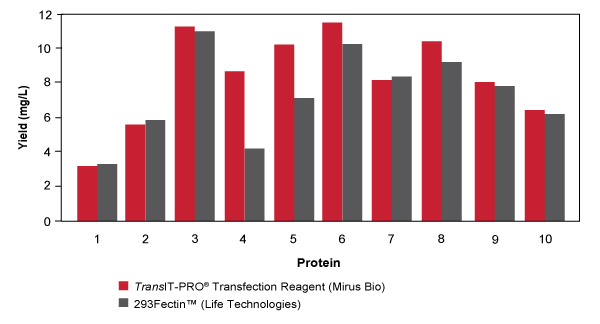
Achieve High Protein Yields Using TransIT-PRO® Transfection Kit in Suspension 293 Cells. Ten different secreted (non‐antibody) proteins were transiently expressed in FreeStyle™ 293‐F cells (Life Technologies) using TransIT‐PRO (1.5:1) or 293fectin™ (Life Technologies, 2:1) transfection reagents according to manufacturer’s protocol. Cells were grown in FreeStyle™ 293 Expression Medium at transfected at a density of 1 x 106 cells/ml. The scale of the transfection for each protein varied between 1‐6 L of culture. More experimental details here. (PDF)
Data courtesy of a TransIT‐PRO pharmaceutical customer.
High Levels of Antibody Expression at Different Volume Scales using TransIT-PRO® Transfection Kit
| Antibody Expression | Scale(L) | Yield(mg/L) |
|---|---|---|
Eight different antibodies were transiently expressed in FreeStyle™ 293‐F cells (Life Technologies) using the TransIT‐PRO Transfection Reagent (1:1) according to manufacturer’s instructions. Cells were grown in FreeStyle™ 293 Expression Medium and transfected at a density of 1 x 106 cells/ml. The scale of the transfection for each protein varied between 1 ‐ 11 L of culture. Data courtesy of a TransIT‐PRO customer from a Contract Research Organization (CRO). | 1 | 18.1 |
| 5 | 15.4 | |
| 6 | 25.0 | |
| 6 | 11.2 | |
| 6 | 20.0 | |
| 5 | 18.8 | |
| 10 | 13.3 | |
| 11 | 33.3 |
TransIT-PRO® Use in the Expi293™ Expression System
- Compatible with high density transfection of Expi293F™ cells
- Streamlined protocol (below) with no enhancer addition required
Download Protocol: TransIT-PRO® Transfection Reagent for EXPI293F™ Cells (PDF)
Protocol for Transfecting Expi293F™ Cells using TransIT-PRO® Reagent
- Determine the total number of cells required for your experiment at least one day prior to transfection. Each 30 ml transfection requires 7.5 × 107 cells in 25.5 ml of Expi293™ Expression Medium.
- Seed the cells at a density of 2.0 × 106 viable cells/ml and maintain 18 – 24 hours prior to transfection to ensure that cells are actively dividing at the time of transfection. Shake flasks overnight on an orbital shaker (125 rpm when using a shaker with a 2 cm orbital throw) at appropriate temperature and CO2 levels (e.g. 37°C, 8% CO2).
- On the day of transfection, quantitate cell number and viability using an automated cell counter or using the trypan blue dye exclusion method. Do not proceed with transfection unless cells are >95% viable.
- Determine the volume of cell suspension containing the number of cells needed for one transfection. Each 30ml transfection requires 7.5 × 107 cells (i.e. 2.5 × 106 cells/ml final concentration).
- Add the appropriate volume of cell suspension to each sterile, disposable 125 ml Erlenmeyer shake flask and bring up the volume to 27 ml by adding fresh, pre-warmed Expi293™ Expression Medium for each 30 ml transfection. Return the cells to the incubator.
- For each 30 ml transfection, prepare reagent-DNA complexes as follows:
- In a sterile tube, dilute 30 μg of plasmid DNA in Opti-MEM® I Reduced Serum Medium (Life Technologies) to a total volume of 3 ml. Mix gently but thoroughly.
- Add 30 μl of TransIT-PRO® Transfection Reagent to the tube containing diluted DNA. Mix gently but thoroughly.
- Incubate the DNA and TransIT-PRO® Transfection Reagent mixture for 20–30 minutes at room temperature to allow transfection complexes to form.
NOTE: This procedure recommends a 1:1 TransIT-PRO®:DNA ratio, which results in the optimal titers for most proteins. However, customer feedback indicates that a 2:2 ratio (i.e. 60 µl TransIT-PRO® + 60 µg DNA per 30 ml culture volume) may result in improved protein expression with some constructs.
- After the DNA-TransIT-PRO® Transfection Reagent complex incubation is complete, add 3 ml of DNA-TransIT-PRO® Transfection Reagent complex alone to each shaker flask from Step 5. To the negative control flask, add 3 ml of Opti-MEM® I medium instead of DNA-TransIT-PRO® Transfection Reagent complex. Each flask should contain a total volume of 30 ml.
NOTE: No enhancer addition is required with the TransIT-PRO® Reagent. - Shake flasks on an orbital shaker (125 rpm when using a shaker with a 2 cm orbital throw) at appropriate temperature and CO2 levels (e.g. 37°C, 8% CO2).
- Cells or media (if recombinant protein is secreted) may be harvested beginning at approximately 48 hours post-transfection and assayed for recombinant protein expression. The incubation time for optimal protein expression depends on the nature of the recombinant protein.
Expi293™ and Expi293F™ are trademarks of Life Technologies Corporation.
Products for Antibody/Protein Production
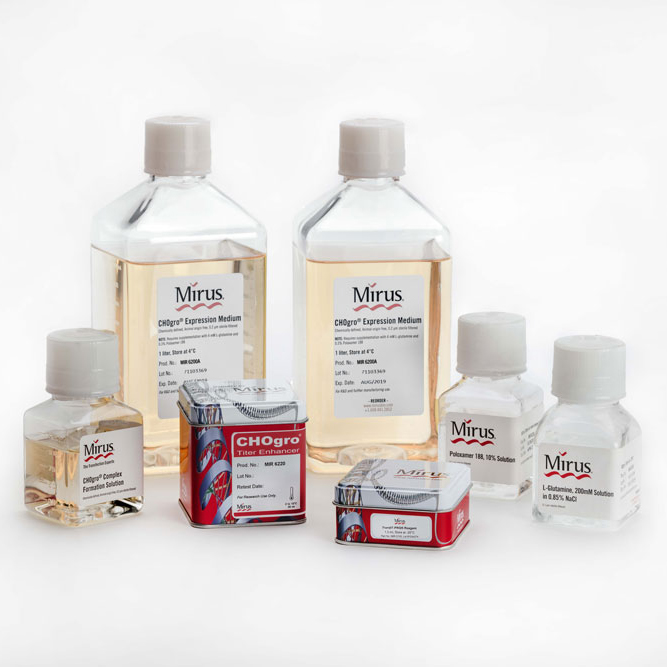
CHOgro® High Yield Expression System
The most advanced system for transient transfection and protein production in suspension CHO cells.
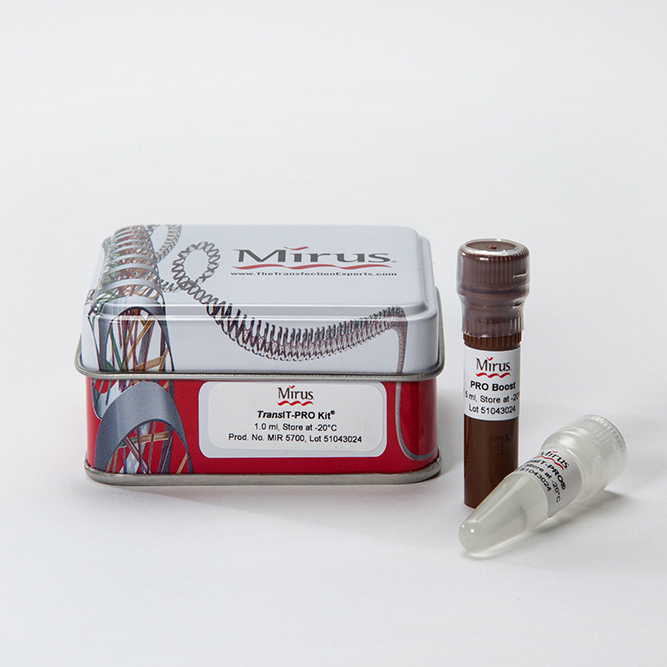
TransIT-PRO® Transfection Reagent & Kit
Technical Resources
Product Details:
Video: High yield protein production using TransIT-PRO® Transfection Kit
![]() Don’t See Your Cell Type? Consult Reagent Agent® Transfection Database
Don’t See Your Cell Type? Consult Reagent Agent® Transfection Database
Citation Database: Check if our reagents have been used by other researchers to transfect your cell type
Technical Support: Communicate directly with a transfection expert